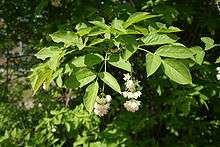Staphylea pinnata
Staphylea pinnata, the European bladdernut,[1] is a species of bladdernut native to Europe and naturalized in Britain.[2]
| Staphylea pinnata | |
|---|---|
 | |
| Scientific classification | |
| Kingdom: | Plantae |
| Clade: | Tracheophytes |
| Clade: | Angiosperms |
| Clade: | Eudicots |
| Clade: | Rosids |
| Order: | Crossosomatales |
| Family: | Staphyleaceae |
| Genus: | Staphylea |
| Species: | S. pinnata |
| Binomial name | |
| Staphylea pinnata L. | |
Description
It is a deciduous shrub growing up to 6 m (20 ft).[3] The species name pinnata refers to the pinnate leaves.[4] Small, white, bell-shaped, fragrant flowers[1] bloom from May to June,[2] on panicles up to 13 cm (5.1 in) long.[1] The flowers are bisexual and pollinated by flies.[2] The fruits are inflated papery capsules, 2-3 lobed, up to 4 cm (1.6 in) long,[1] ripening from September to November. The seeds are edible, and are said to taste like pistachios.[2]
Cultivation
Staphylea pinnata can be grown in full sun to partial shade, and tolerates a variety of soils. It is hardy in zones 6–8.[1] It has low drought tolerance.[3]
| Wikimedia Commons has media related to Staphylea pinnata. |
gollark: Interesting. What is „solenoid„?
gollark: Hmm. I thought you were doing nothing and ojas/momin were doing the course.
gollark: It is quite long. I don't actually read paragraphs with more than 3 lines in them.
gollark: How is what hard?
gollark: "4.11 big data"?
References
- Missouri Botanical Garden—Staphylea pinnata
- Plants for a Future—Staphylea pinnata
- Plant Database—Staphylea pinnata
- Heiss, Andreas G.; Filipovic, Dragana; Nedelcheva, Anely; Ruß-Popa, Gabriela; Wanninger, Klaus; Schramayr, Georg; Perego, Renata; Jacomet, Stefanie (October 2014). "A Fistful of Bladdernuts: The Shifting Uses of Staphylea pinnata L. as Documented by Archaeology, History, and Ethnology" (pdf). Folk Life. 52 (2): 95–136. doi:10.1179/0430877814Z.00000000031. Retrieved 17 August 2015.
This article is issued from Wikipedia. The text is licensed under Creative Commons - Attribution - Sharealike. Additional terms may apply for the media files.